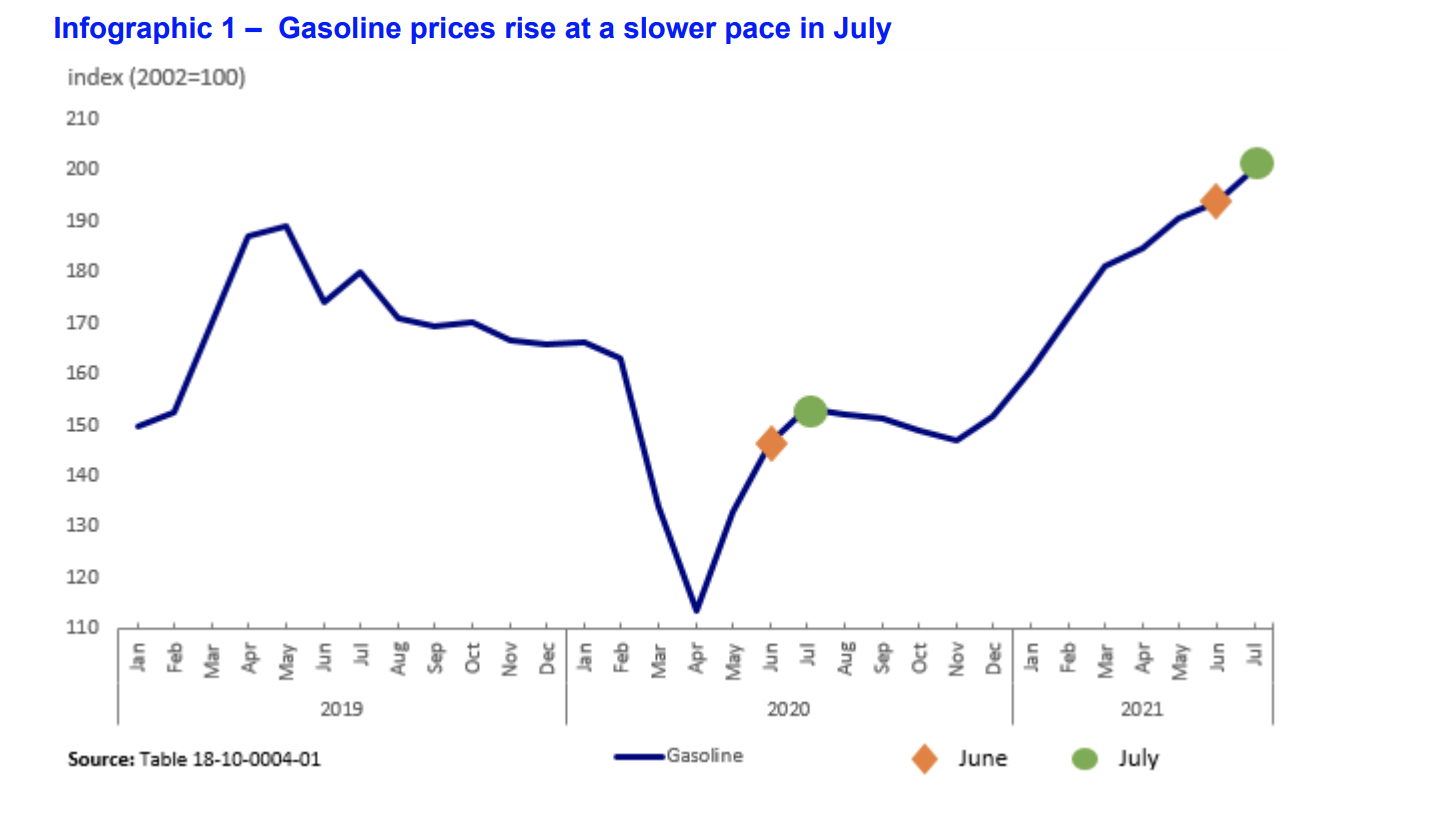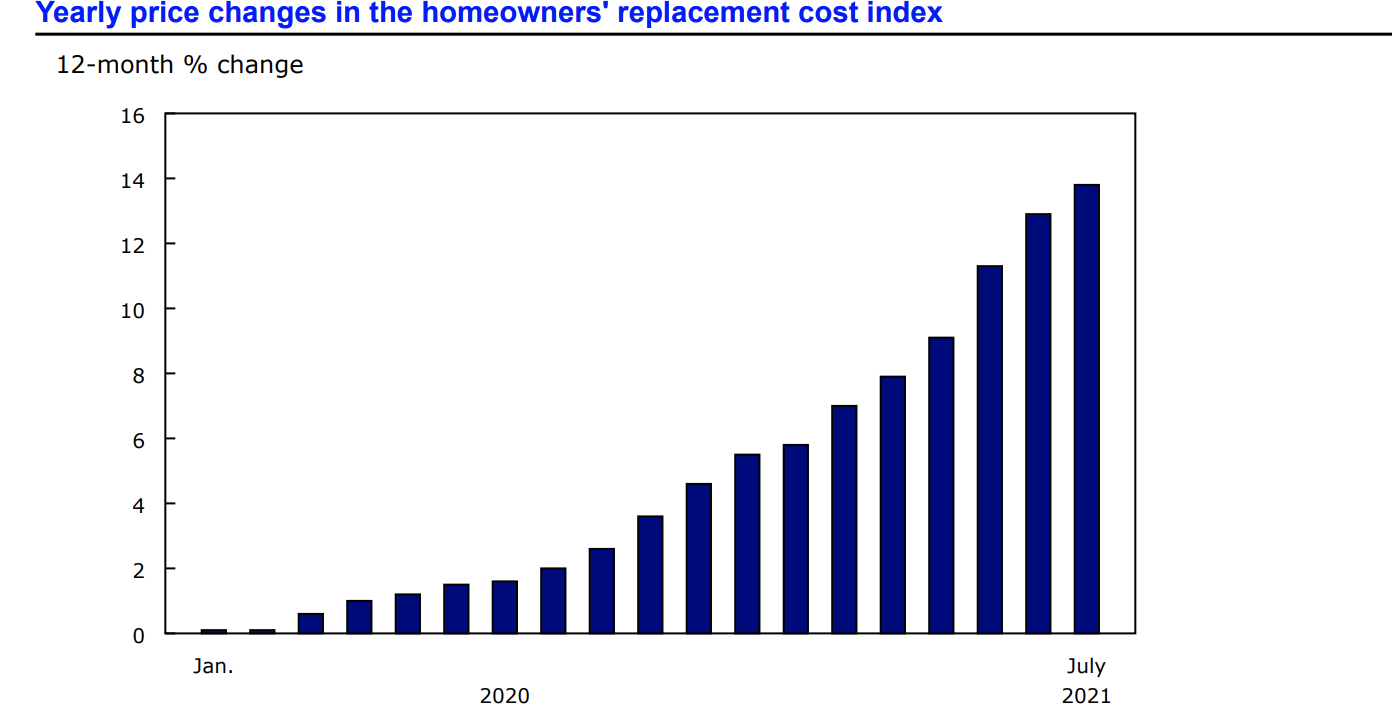The Consumer Price Index edged up 3.7% in July, on a year-over-year basis reported Statistics Canada. This marks a percentage gain from the 3.1% increase the previous month.
“Prices rose at a faster pace year over year in six of the eight major components in July, with shelter prices contributing the most to the all-items increase,” explained Stats Can.
Excluding the price of gasoline, the CPI increased 2.8% over the last 12-month period. In July, on a monthly basis, the CPI edged up 0.6% – on a seasonally adjusted monthly basis, the percentage rose 0.5%.

(Source: Statistics Canada)
Gasoline Index
In July, year-over-year there was less of an increase in gas prices (30.9%), compared to the 32% rise in June.
“A base-year effect continued to impact the gasoline index, as prices in July 2020 increased 4.4% on a month-over-month basis when many businesses and services reopened.
In July 2021, gasoline prices increased 3.5% month over month, as oil production by OPEC+ (countries from the Organization of Petroleum Exporting Countries Plus) remained below pre-pandemic levels though global demand increased,” said the agency.
Shelter Index
Year-over-year, the shelter index rose 4.8% in July. Regarding composite indexes, the homeowners’ replacement cost index, which is correlated to the new home prices, saw the largest annual rise in 34 years.
“The homeowners’ replacement cost index, which is related to the price of new homes, continued to trend upward, rising 13.8% year over year in July, the largest yearly increase since October 1987. Similarly, the other owned accommodation expenses index, which includes commission fees on the sale of real estate, was up 13.4% year over year in July,” said Statistics Canada.

(Source: Statistics Canada)
Food Index
Over the last 12-month span, the food index increased 1.7% in July. Statistics Canada released a statement pertaining to the effects of the COVID-19 pandemic on the price of food.
“Given that food is a frequently purchased good, high prices are often the subject of discussion, as are great deals. The price of food is influenced by a number of factors. Weather, for example, is the most important variable for maintaining the supply of crops. As farmers weather the elements, prices will reflect a good harvest or the lower supply that comes with a poor harvest. This was experienced in 2019, when lower vegetable yields were partly attributable to an El Niño climate pattern.
The COVID-19 pandemic has also influenced food prices in Canada. As restaurants closed for extended periods in some parts of the country, overall demand changed. Canadians consume different foods at restaurants than at home. For example, this shift led to a temporary oversupply of potatoes for French fries early in the pandemic. Suppliers also had to adapt, in some cases shifting products destined for restaurants to grocery stores.
In the Consumer Price Index (CPI), food is the second-most important component by basket weight, representing 16.24% of the 2020 CPI basket. The food component is broken down into two categories: food purchased from stores (11.74% of the basket) and food purchased from restaurants (4.50%).
Overall food prices increased in July 2021 (+1.7%) compared with July 2020. Prices for food purchased from restaurants grew by 3.1%, the highest increase since January 2019, mainly driven by food purchased from fast food and take-out restaurants (+3.3%). Food purchased from stores (+1.0%) also rose in July. Canadians consume a variety of different foods, which can result in large price changes that offset each other at the aggregate level. For instance, prices for meat (+3.1%) and dairy products (+3.5%) increased on a year-over-year basis in July, while prices for fresh vegetables (-7.5%) and fresh fruit (-0.6%) fell during the same period.
Statistics Canada will continue to monitor developments in food prices and the impact on consumer price inflation.”
Source cited: https://www150.statcan.gc.ca/n1/daily-quotidien/210818/dq210818a-eng.htm


